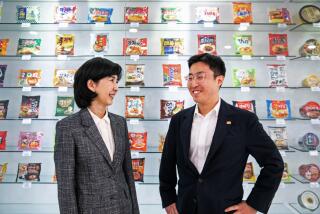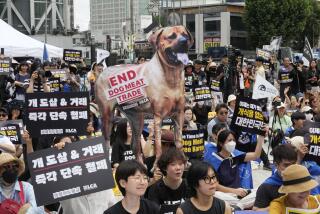North Korea bends a little to air British movie
Reporting from Seoul — The curtain that shrouds North Korean culture and daily life opened briefly this week with reports that state television in Pyongyang had broadcast the British soccer film “Bend It Like Beckham.”
In one of the world’s most reclusive nations, Western movies and TV fare are largely verboten, especially a film that deals with such racy subject matters as intercultural relationships, homosexuality and religion.
But censors took care of that: The 2002 movie starring Parminder Nagra and Keira Knightley as young soccer players and Jonathan Rhys Meyers as their coach was edited down to one hour, leaving little more than scenes of a sport that is beloved to most North Koreans. Then it was back to the wooden fare of crop-yield documentaries and paeans to the regime’s strongman, Kim Jong Il.
For observers in South Korea, the broadcast helped shed a bit of light on an enduring mystery: In a country where citizens exist almost entirely under state control, what do people do for fun? What luxury items are hot this season? And what effects do the lingering famine and international sanctions have on daily life?
For years researchers have used popular culture as a barometer of life in North Korea, often known as the Hermit Kingdom. Interviews with defectors in China and South Korea indicate that food and money shortages have kept most residents trapped in a hardscrabble existence with a standard of living that is one of the lowest on Earth.
Yet a few in Pyongyang, the North Korean capital, have enough disposable income to have access to Western DVDs, South Korean sitcoms and even pornography smuggled in from China. Such luxuries come with a risk: Foreign pop culture is strictly banned for most people and violators face hefty fines or jail terms.
Experts say tastes of the last year — among both haves and have-nots — reflect a curiosity about the outside world and reliance on tradition, as well as making do with what is available on the market. For example, one recent study showed that the tight form-fitting jeans worn in the West are all the rage for women, and some men sport hairstyles copied from South Korean soap operas.
Consumers also show a preference for blue crab and instant ramen noodles. But one of the most popular dishes is something a little more traditional: pig-intestine rolls that are more available now that the military has stopped confiscating pork from consumers, experts say.
Kim Young-soo, a political scientist at Sogang University in Seoul, recently completed a survey of 2,000 defectors to gauge the latest trends.
Some are the result of sanctions against North Korea, he said. The restrictions have blocked exportation of pine mushrooms and blue crab to South Korea and Japan, making those items are available to North Koreans.
Also, with fertilizer imports banned, North Korean farmers are forced to make do with manure: human feces.
Other trends are linked to the whims of Kim Jong Eun, who was recently designated to succeed his ailing father. The elder Kim preferred women to wear long skirts, but the son, who studied abroad, has seen the wisdom in allowing women to wear pants in public.
“Kim Jong Il always preferred that women wear skirts rather than pants. So women used bikes to shuttle heavy goods and pulled the bicycles” because the skirts were so unwieldy, said Kim, the researcher. “Now as more and more wear jeans and pants, women in Pyongyang are actually using bicycles as a mode of transportation.”
North Koreans who have a TV or radio have picked up transmissions from cosmopolitan Seoul, watching presidential speeches and commercials that have shown them that life in South Korea is not as horrible as portrayed by their government. In fact, it seems like a heaven of wealth and choice, leading many to defect.
In a recent survey at a center for defectors in Seoul, more than half of the 144 teenagers polled said they had watched South Korean TV and movies while living in North Korea.
Analysts say that even with North Koreans’ exposure to outside ideas and styles, they expect little public pressure to overturn the government.
“The change is not yet strong enough to have any significant effect on challenging the North’s political system,” said Yun Duk Min, a North Korea expert at Seoul’s Institute of Foreign Affairs and National Security.
“It would be misleading to think there’s a change in North Korean society as a whole because these consumer trends are still limited to a small portion of the population.”
Kim is with The Times’ Seoul Bureau.
More to Read
Sign up for Essential California
The most important California stories and recommendations in your inbox every morning.
You may occasionally receive promotional content from the Los Angeles Times.











